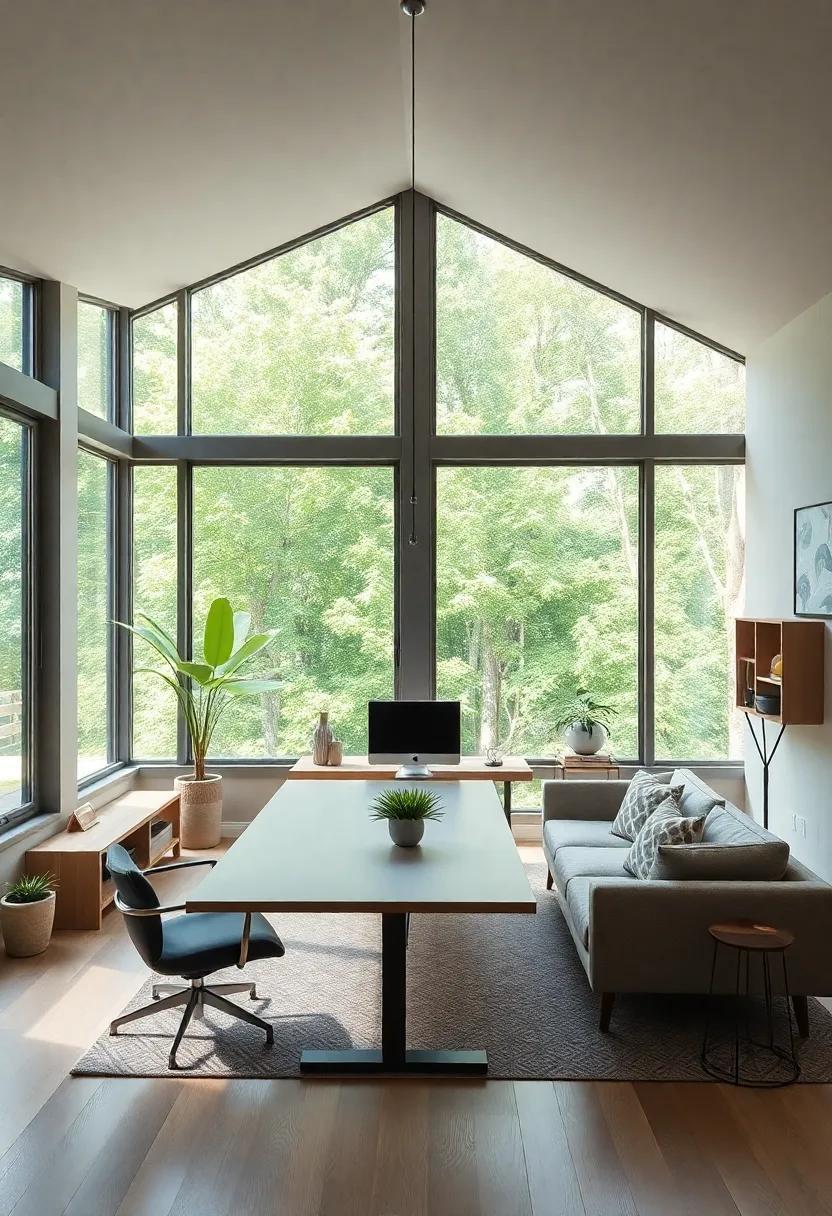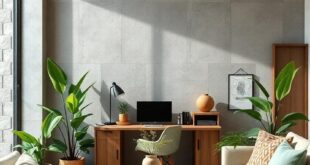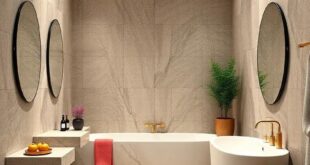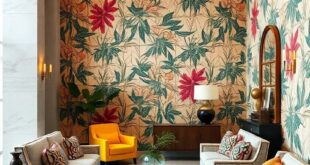In an era were the boundaries between work and home continue to blur, the concept of the home office has evolved into a sanctuary that nurtures both productivity and well-being. One of the most compelling trends emerging from this transformation is the integration of biophilic design—an approach that reconnects us with nature in our daily environments. As remote work becomes the norm for many, the allure of expansive windows that frame the great outdoors is gaining momentum.These portals not only invite natural light but also create a seamless link between the internal workspace and the external world, fostering a sense of tranquility and inspiration. In this article, we explore the rise of biophilic home offices, examining how the thoughtful use of window design and natural elements is reshaping our workspaces into vibrant, nature-infused havens. Join us as we delve into the intersection of architecture, wellness, and productivity, unveiling the benefits and beauty of bringing nature indoors.
Exploring the Concept of Biophilia in Modern Home Design
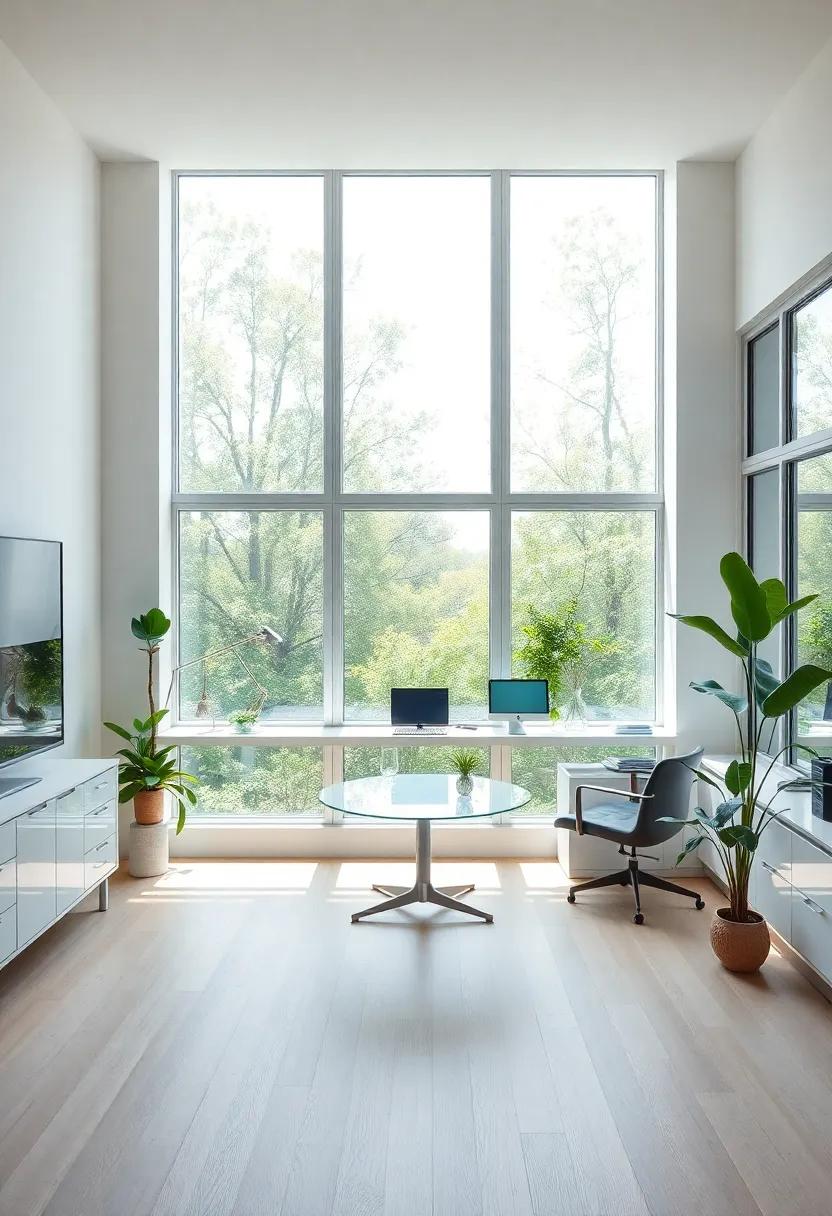
Incorporating elements of nature into home offices via expansive windows transforms not just the aesthetics but also the functionality of workspaces. These large openings to the outside world invite natural light,reducing the reliance on artificial sources,which can uplift mood and enhance productivity. Visual connectivity with the outdoor surroundings creates a seamless transition between the indoor and outdoor realms, making the workspace feel less claustrophobic and more invigorating. Additionally,the soothing views of greenery or flowing water can significantly decrease stress levels,making remote work more enjoyable and lasting in the long run.
To fully embrace the biophilic design beliefs, homeowners can consider integrating various natural elements alongside their expansive windows. the incorporation of living plants, natural materials, and water features can further enhance the workspace. Here’s how you can infuse biophilic elements in your home office:
| biophilic Element | Benefits |
|---|---|
| Indoor Plants | Improve air quality and reduce noise |
| Natural Light | Boosts mood and increases focus |
| Natural Materials (Wood, stone) | Creates a warm, inviting atmosphere |
| Water Features | Enhances tranquility and reduces stress |
The Transformative Power of Natural Light in workspaces
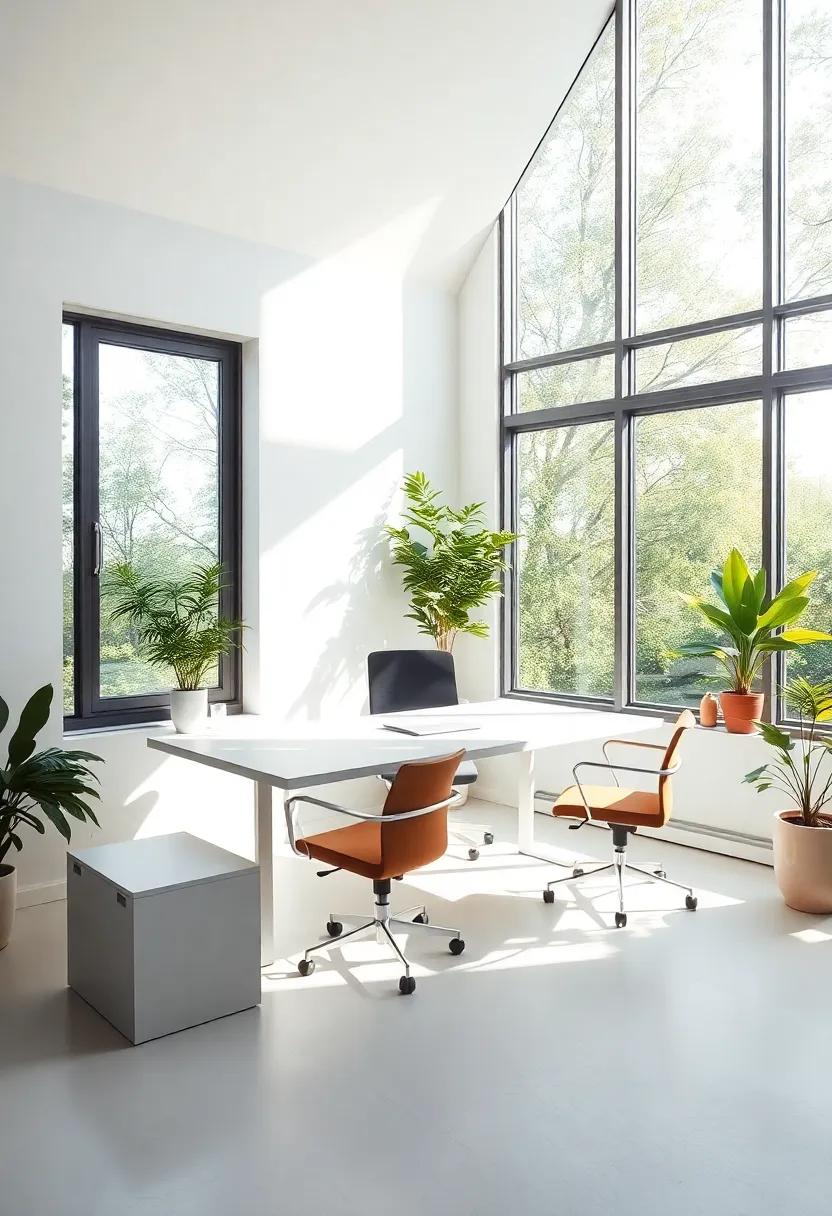
Harnessing natural light in home offices is more than just a design choice; it’s a catalyst for enhancing productivity and well-being. Exposure to daylight can significantly affect mood, energy levels, and overall focus. For many, working under the soft glow of sunlight can feel invigorating, creating an inviting atmosphere that helps combat the monotony of remote work. Studies show that environments bathed in natural light can lead to a 25% increase in productivity and improve overall job satisfaction. The use of expansive windows not only connects individuals with the outside world but also fosters a sense of tranquility that is crucial for sustained concentration.
Incorporating biophilic elements into office design allows for a seamless blend of nature and work, making the workspace not just a place of productivity but also one of inspiration. Consider these features that enhance the transformative power of natural light:
- Large Windows: Maximizing view and light.
- Skylights: Infusing warmth from above.
- Glass Dividers: Maintaining openness while providing structure.
- Reflective Surfaces: Amplifying light distribution throughout the space.
Adaptive office designs combine functionality with aesthetics, creating spaces that are not only productive but also restorative. The following table summarizes some benefits of natural light in a workspace:
| Benefit | description |
|---|---|
| Enhanced Mood | Natural light boosts serotonin, reducing stress. |
| Improved Sleep | Exposure to daylight helps regulate sleep patterns. |
| Increased Creativity | Bright environments stimulate innovative thinking. |
| Energy Efficiency | Using natural light can reduce reliance on artificial lighting. |
designing Open Spaces: How Expansive Windows Enhance Creativity
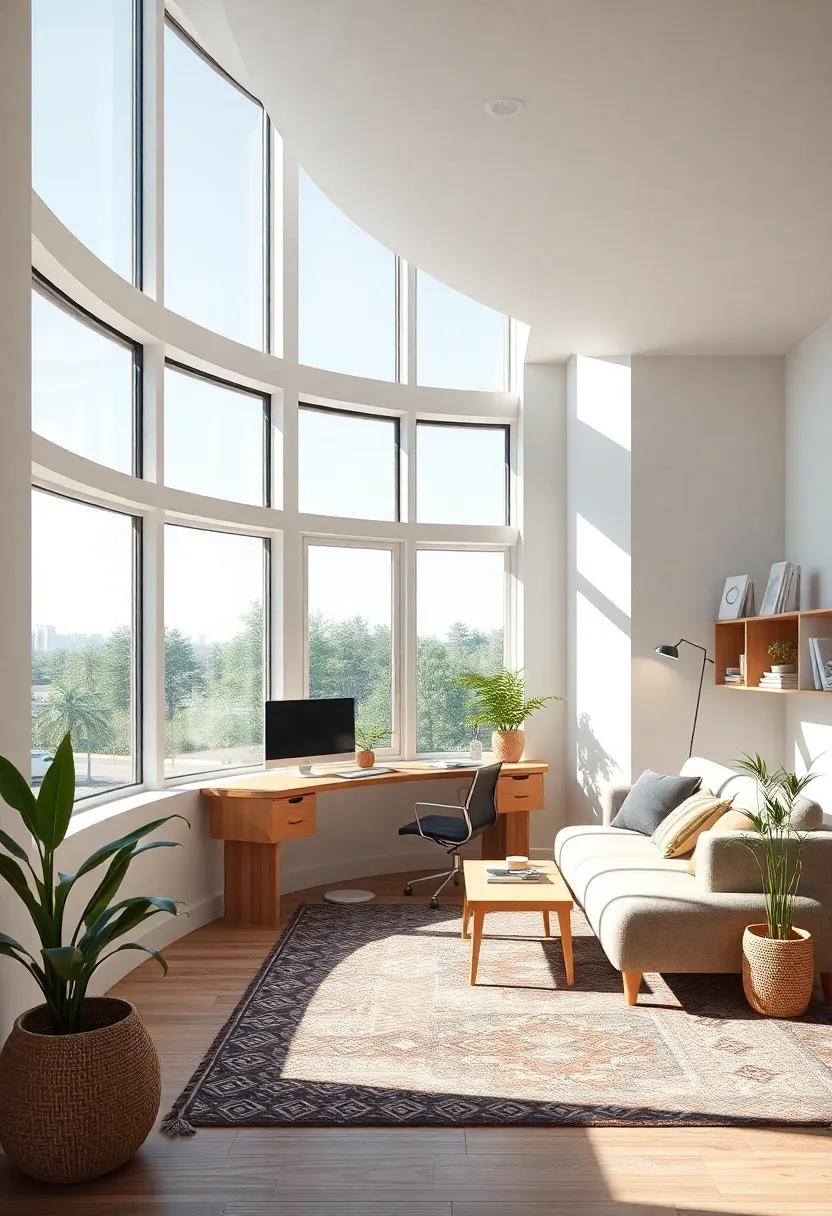
Expansive windows play a pivotal role in blurring the lines between indoor and outdoor environments, fundamentally transforming how we perceive our workspaces. These large glass facades invite natural light to flood into the room, creating a warm, inviting atmosphere that can invigorate the mind and stimulate creativity. The presence of natural light is shown to increase productivity and mood, reducing the dreariness often associated with traditional office setups. Moreover, the panoramic views of lush greenery and open sky serve as a backdrop that can inspire innovative thoughts and complex problem-solving. When surrounded by the beauty of nature, it becomes easier to think outside the box and generate unique ideas.
Incorporating elements of biophilic design goes beyond mere aesthetics; it can significantly enhance mental well-being and cognitive function. By integrating expansive windows with features such as:
- Natural ventilation: promotes airflow and comfort
- Shaded seating areas: provide options for various working styles
- Indoor gardens or plant displays: connect to nature and reduce stress
these spaces become sanctuaries of creativity where individuals can thrive. the interactive dialog between nature and indoor work environments nurtures inspiration and adaptability, proving that the architecture of our surroundings can profoundly shape our creative processes.
Incorporating Indoor Plants for a lively Home Office Atmosphere

Transforming your home office into a breath of fresh air is effortlessly achieved through the inclusion of indoor plants. These green companions not only beautify your workspace but also improve air quality and boost productivity. Consider incorporating species such as:
- Snake Plant: A low-maintenance choice that thrives in varying light conditions.
- Pothos: With its trailing vines,it adds a playful touch while purifying the air.
- Spider Plant: Renowned for its ability to reduce indoor pollutants and its charming appearance.
To create an inviting and lively atmosphere, arrange plants at different heights and positions. Elevate smaller pots on shelves or desks to draw the eye upward while placing larger plants in corners to fill empty spaces.Don’t shy away from creativity; you can use decorative pots or hang plants from the ceiling to maximize visual interest. Incorporating these natural elements not only reduces stress but also fosters a sense of connection to nature, inspiring creativity and focus during your work hours.
Choosing the Right Window Placement for Optimal Natural Views
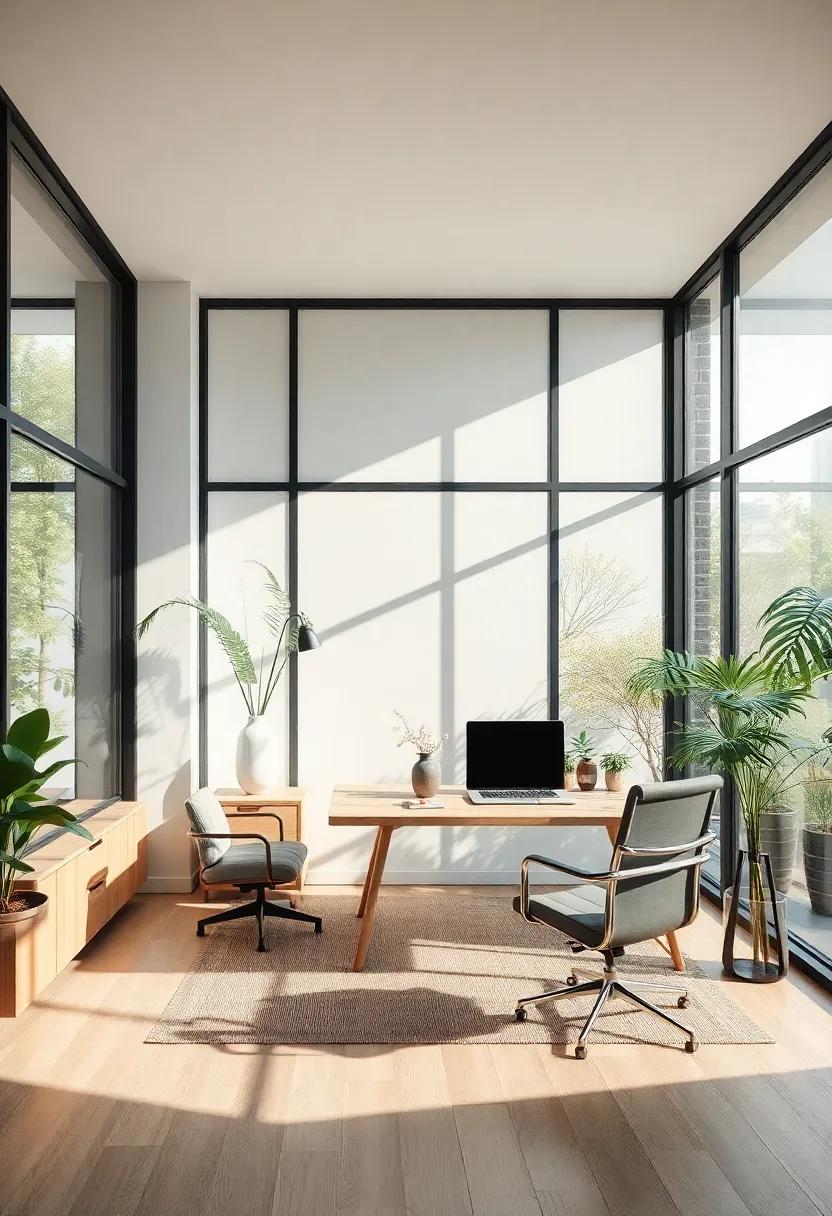
Thoughtful window placement is essential in designing a biophilic home office, transforming mundane workspaces into inspiring retreats that connect occupants with the beauty of the outdoors.When considering optimal views, think about the landscape beyond your walls. To maximize natural serenity, prioritize windows that frame views of vibrant gardens, towering trees, or lush hills. Strategic placement can create a visual focal point that not only enhances the aesthetic appeal of your workspace but also uplifts your mood during long hours spent working. By ensuring that windows align with the best vistas, you can cultivate a sense of tranquility and reduce stress in your daily routine.
when planning your window layout,take into account the sun’s trajectory and seasonal changes. Consider these aspects for your design:
- Orientation: South-facing windows often provide ample sunlight, while north-facing ones offer softer illumination.
- Height: Installing windows at eye level allows for an uninterrupted view, making the connection to nature more personal.
- Size: expansive windows enhance the indoor-outdoor experience, bringing the outside in and making even small spaces feel larger.
Implementing these principles can lead to an enriched workspace experience. Below is a simple comparison of window orientations and their impacts on natural light:
| Window Orientation | Benefits | Considerations |
|---|---|---|
| south | Maximized sunlight, warmth | Potential for overheating in summer |
| East | Bright mornings, soft evenings | Less light in the afternoon |
| West | Evening light, sunset views | Harsh light in the afternoon |
| North | Consistent light throughout the day | Less direct sunlight |
The Role of Color in Biophilic Home Office designs
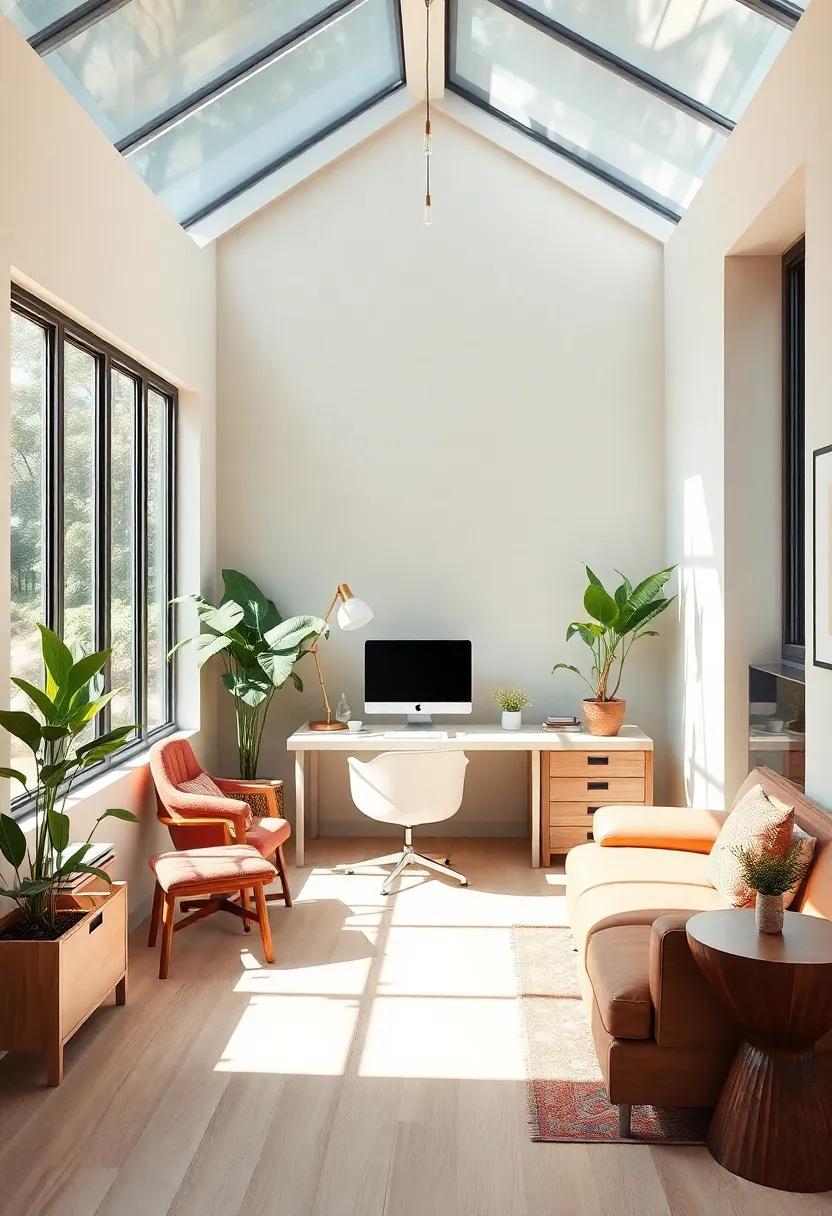
The integration of color in biophilic home office designs plays a crucial role in enhancing mood, productivity, and well-being. Natural hues inspired by the outdoors can evoke a sense of tranquility and connection to nature. Shades of green, for example, mimic the vibrant foliage of a forest, while soft blues can reflect the calming essence of a clear sky. These color palettes not only create an inviting atmosphere but also help to reduce stress and improve focus. To maximize the benefits of color, consider the following:
- Choose earthy tones to ground the space and promote relaxation
- Incorporate accent colors that inspire creativity and energy, such as warm yellows or cool greens
- Utilize varying shades to establish depth and character in the office
Furthermore, the impact of natural light on color perception cannot be overstated.expansive windows not only flood the workspace with sunlight but also allow colors to shift and transform throughout the day, altering the mood and functionality of the space. A well-lit room can make colors appear more vibrant and alive, fostering a dynamic work environment. To illustrate how light interacts with color in biophilic designs, refer to the table below:
| Time of Day | Color Perception | Suggested Color |
|---|---|---|
| Morning | Bright and Inviting | Soft Yellow |
| Afternoon | Warm and Energetic | Vibrant Green |
| evening | Calm and Reflective | Cool Blue |
Textural Elements: Bringing Natural Materials into Indoor Spaces
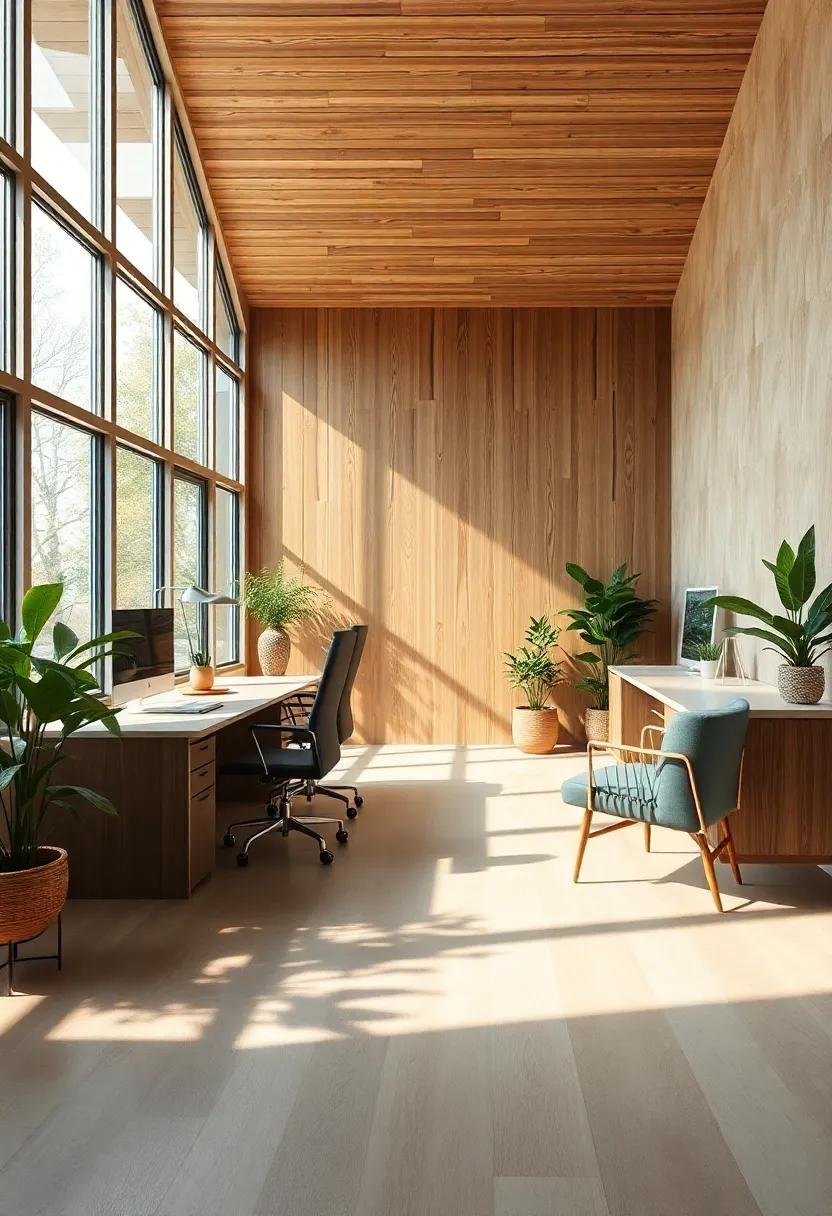
Incorporating natural materials into your indoor environment enhances not just aesthetics but also the overall well-being of the inhabitants. Wood, stone, and even textiles made from organic fibers can create a harmonious ambiance that mimics the serenity of outdoor spaces. Consider the following elements:
- Wood: Whether it’s reclaimed barn wood for a rustic table or sleek bamboo flooring, wood brings warmth and texture.
- Stone: Natural stone accents, such as slate or marble countertops, provide a grounding effect while adding sophistication.
- Textiles: Linen,cotton,and wool fabrics help soften a space,making it more inviting and pleasant.
To further emphasize the connection to nature, layering these materials can create depth and interest. A textured wool rug can contrast beautifully with a smooth wooden floor, while a rough stone fireplace can serve as a stunning focal point against soft furnishings. Here’s a brief overview of common natural materials and their benefits:
| Material | Benefits |
|---|---|
| Reclaimed Wood | Eco-friendly, unique character, warmth |
| Natural Stone | durable, timeless appeal, variety of textures |
| Cotton and Linen | Breathable, versatile, easy to maintain |
Setting the Mood: Natural Lighting versus Artificial Lighting
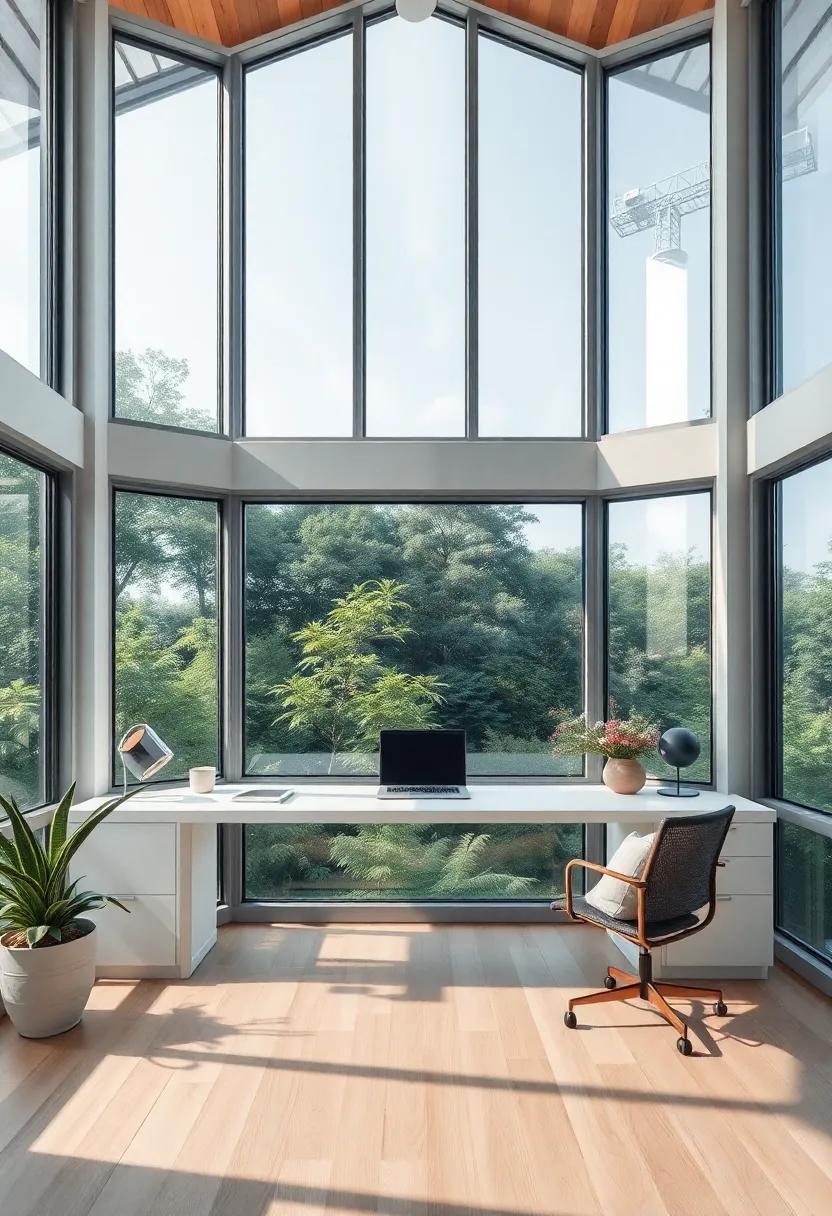
Natural lighting has become a cornerstone of modern home office design, acknowledged for its profound impact on mood and productivity. Expansive windows not only invite the outdoors in but also provide a dynamic backdrop that shifts with the time of day,enhancing the workspace with an ever-changing palette of light. Workers find themselves energized by the warmth of the sun’s rays in the morning and relaxed by the soft hues of twilight. The integration of lush greenery outside provides a living artwork,offering a soothing view that can significantly reduce stress levels.
In contrast, artificial lighting, while essential during off-peak sunlight hours, often lacks the same invigorating quality. Though modern LED options have made great strides in emulating natural light,they still fall short in replicating its dynamic essence.The best home office setups blend both lighting types to create a harmonious environment. Consider mixing sources to achieve the ideal ambiance:
- Daylight: Utilize natural light as much as possible.
- Task Lighting: Incorporate desk lamps with adjustable brightness.
- Accent Lighting: Use soft fixtures to highlight features and plants.
- Control Systems: Implement smart lighting that adjusts according to the time of day.
| Lighting Type | Benefits | Drawbacks |
|---|---|---|
| Natural Lighting | Enhances mood,improves focus,reduces eye strain | Dependent on weather,glare issues |
| Artificial Lighting | Consistent availability,adjustable,variety of options | Can cause fatigue,often lacks warmth |
Creating Visual Connections: Simulating Outdoor Landscapes Indoors
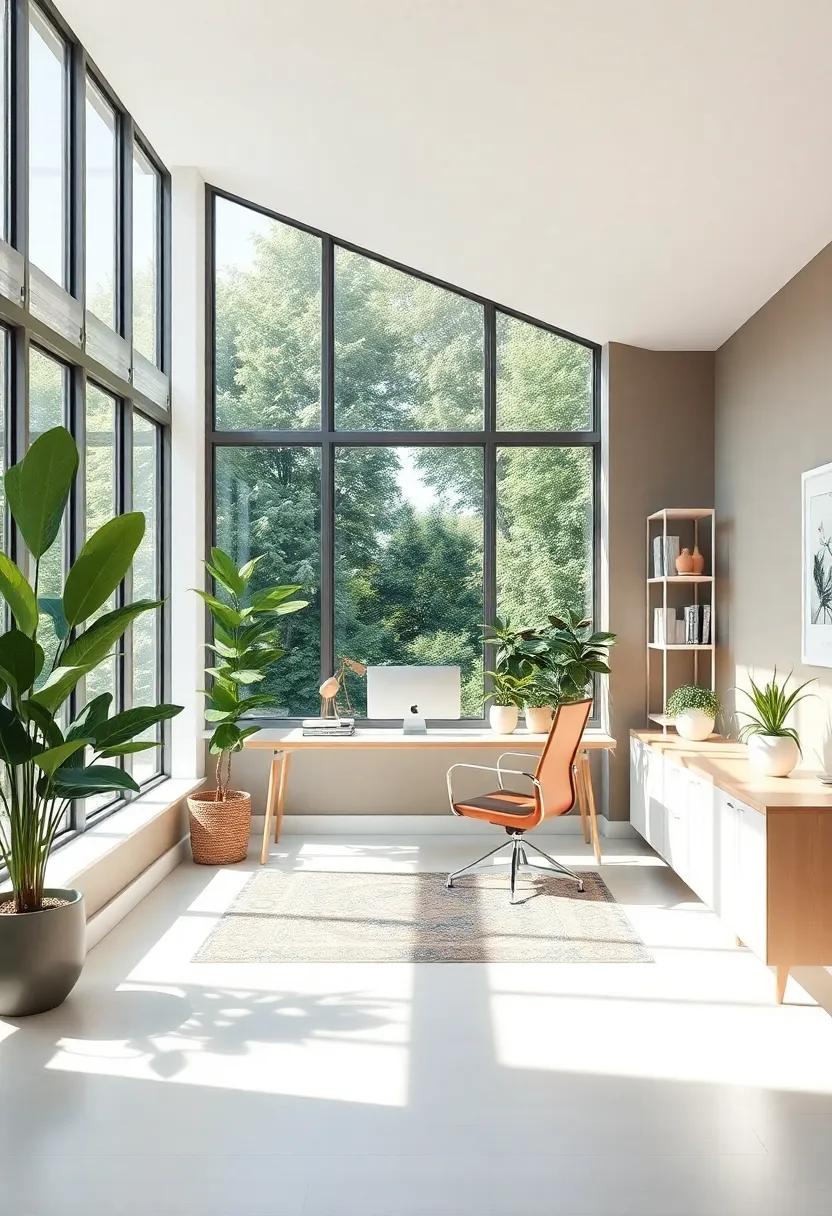
In today’s fast-paced world, recreating the serenity of nature within your home can transform not only your workspace but also your overall well-being. By stimulating the senses through indoor landscapes, you can experience a blend of comfort and productivity. Imagine a room filled with plants, natural light pouring in through expansive windows, and elements that mimic the outdoors. To achieve this, consider the following features that can help to bridge the gap between indoor and outdoor environments:
- Large Windows: Incorporate floor-to-ceiling windows that invite abundant natural light, blurring the boundaries between inside and out.
- Natural Materials: Use wood,stone,and other organic materials that echo nature’s textures and warmth.
- indoor Gardens: Create small indoor gardens or vertical plant walls that add a vibrant touch of greenery.
- Water Features: Consider adding a small fountain or aquarium to incorporate the calming sound of water into your space.
To further enhance the visual appeal of your indoor landscape, you can introduce elements that connect to the outside world through art and décor. wall murals and large canvas prints that depict scenic views—lush forests, tranquil lakes, or gentle mountains—can evoke a sense of peace. You might also include textures reminiscent of the outdoors, such as saltillo tiles or sisal rugs. Here’s a summary table of decorative elements that can enhance your biophilic design:
| Element | Description |
|---|---|
| Wall Murals | large artwork depicting serene landscapes. |
| Natural Fiber Textiles | Fabrics made from organic materials that mimic the feel of the outdoors. |
| Live Plants | Indoor flora that improves air quality and promotes relaxation. |
| Soft Earthy Colors | Warm palettes that reflect natural landscapes. |
Soundscapes of Nature: Enhancing Focus in Home Offices

In the quest to cultivate a productive home office environment, the auditory elements of nature play an essential role in boosting focus and creativity. Sounds such as the gentle rustling of leaves or the soft trickle of a stream create a calming atmosphere that can significantly improve concentration levels. By incorporating nature recordings or dedicated sound machines, workers can transport themselves into serene outdoor settings, evoking a sense of tranquility.Placing these audio elements within your workspace encourages a biophilic connection, helping to alleviate stress and enhance cognitive function.
moreover, studies have suggested that certain frequencies of nature sounds can actually foster better mental acuity. For an enriched auditory experience, consider incorporating:
- Birdsong – Increases alertness and mood
- Ocean waves – Promotes relaxation
- Rainfall – Helps to mask distracting noises
- wind through trees – Enhances feelings of well-being
To facilitate your focus-enhancing initiatives, you might also want to explore different playlists that align with your tasks, organizing them in a simple chart:
| Activity | recommended Sound |
|---|---|
| Creative Work | Nature Sounds with Birdsong |
| Deep Focus | Gentle Ocean Waves |
| Breathing Space | Soft Rainfall |
| Background Ambiance | Wind through Trees |
Furniture Choices: Merging Comfort with Natural Aesthetics
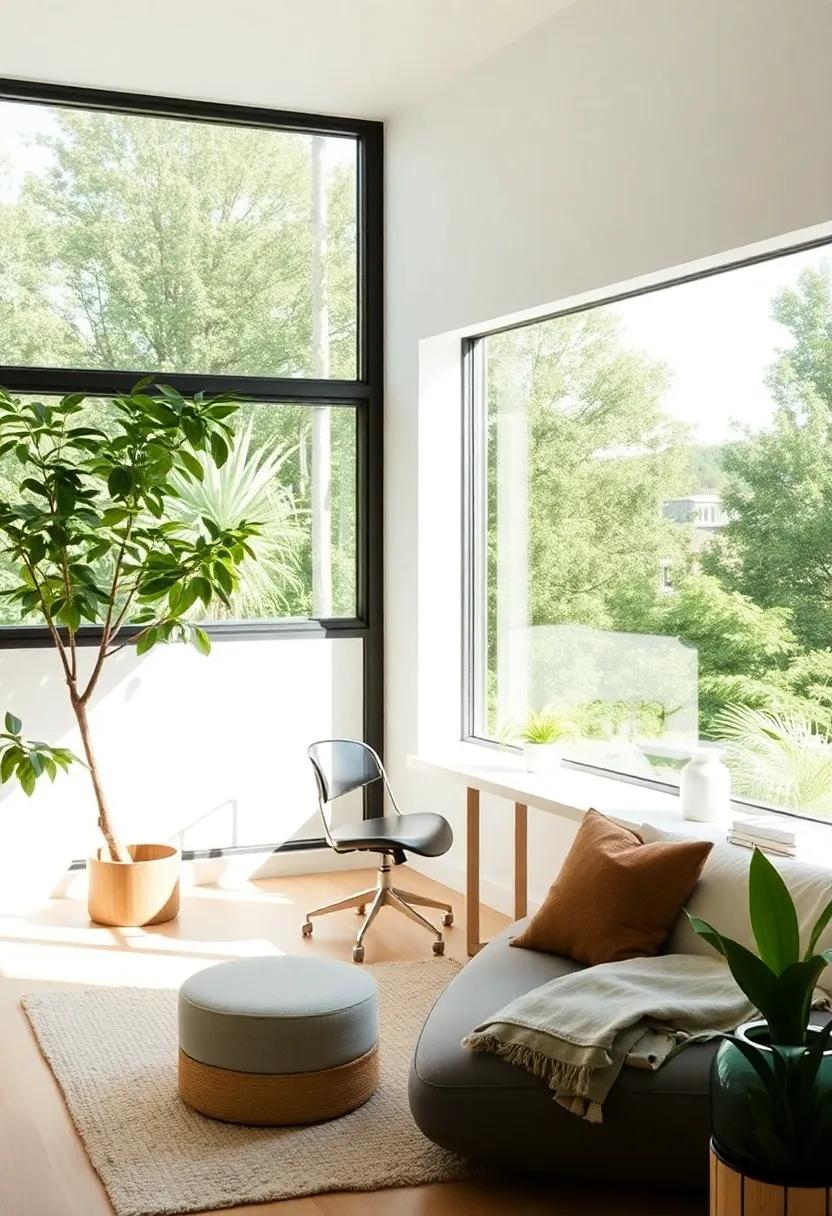
In a world increasingly driven by technology, the design of home offices has evolved to embrace a more harmonious relationship with nature.Opting for furniture that enhances both comfort and aesthetics can create an inviting workspace that inspires creativity and productivity. Consider pieces made from sustainable materials, which not only contribute to a healthy environment but also add a natural touch to your decor. When selecting furniture, look for:
- Organic shapes that mimic natural forms, helping to create a calming atmosphere.
- Natural fibers like jute or cotton for rugs and cushions, bringing warmth and texture.
- Live edge wood that maintains the uniqueness of each piece and highlights the beauty of nature.
As space and light play crucial roles in the overall ambiance, integrating items that reflect the outdoors can enhance your home office experience. for instance, a well-placed desk positioned by expansive windows not only benefits from natural light but can also act as an anchor for your furniture layout. To further enhance this connection, consider a layout that includes:
| Furniture Type | Purpose | Recommended Material |
|---|---|---|
| Ergonomic Chair | supportive seating for long hours | Recycled materials |
| Standing Desk | Encourages movement and variation | Bamboo or reclaimed wood |
| Shelving Units | Display plants and decor | Metal and wood combination |
The Impact of Landscaping on Indoor Work Environments
The integration of natural elements in workspaces, notably through landscaping, has proven to significantly enhance indoor environments. Plants and greenery not only contribute to aesthetic appeal but also play a key role in improving air quality and fostering a sense of tranquility and productivity. In biophilic design, the strategic placement of indoor plants, natural materials, and water features can create an atmosphere that reduces stress and stimulates creativity. Employees who are surrounded by nature-inspired designs report higher levels of satisfaction and engagement, making it essential to consider these elements in a home office setting.
Moreover, expansive windows that invite natural light into the workspace enhance the overall well-being of individuals working from home. Studies have shown that exposure to natural light can improve mood and energy levels, while also reducing eye strain associated with artificial lighting. By incorporating landscaped views from large windows, individuals can enjoy the calming effects of nature while maintaining productivity. To illustrate the benefits of such design choices, consider the following comparative insights:
| Feature | Traditional Office | Biophilic Home Office |
|---|---|---|
| Air Quality | Often poor due to closed environments | Enhanced with indoor plants |
| Employee Well-Being | Higher stress levels | Increased comfort and reduced anxiety |
| Productivity | Varied levels | Noticed improvement with natural elements |
| Creativity | Often stagnant | Boosted by exposure to nature |
Sustainable Practices in Biophilic Interior Design

Integrating sustainable practices into biophilic interior design not only enhances our connection with nature but also promotes eco-friendly living. By utilizing natural materials and energy-efficient solutions,designers can create home offices that are not only beautiful but also environmentally responsible. Key sustainable practices include:
- Incorporating locally sourced materials to reduce the carbon footprint
- using recycled or upcycled furnishings to minimize waste
- Employing low-VOC paints and finishes to improve indoor air quality
- Maximizing natural light through expansive windows to decrease reliance on artificial lighting
Moreover, the integration of living walls or indoor plants can significantly improve the overall health of indoor environments. These elements help purify the air and enhance mood, making workspaces more inspiring. A well-thought-out approach to incorporating greenery can include:
| Plant Type | Benefits |
|---|---|
| Snake plant | Improves air quality and is low maintenance |
| Pothos | Effective at absorbing toxins and helps with humidity control |
| Peace Lily | Boosts indoor air quality and adds aesthetic appeal |
Utilizing Smart Technology to Maximize Natural Features
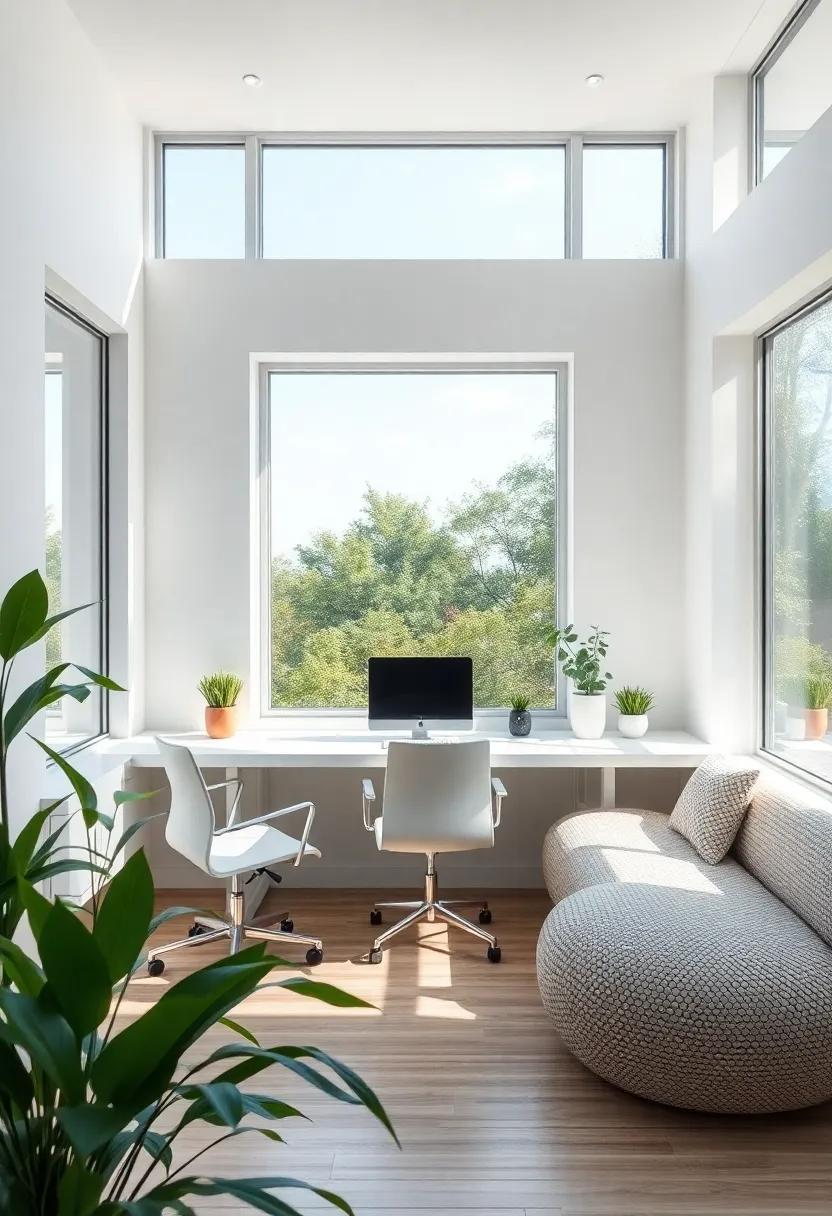
In the quest for a harmonious balance between work and the natural world, smart technology plays a pivotal role in enhancing the appeal of biophilic home offices. With tools that seamlessly integrate into our daily lives, we can now leverage technology to highlight and amplify the beauty of natural features. Consider these technological advancements:
- Automated Blinds: Control sunlight exposure to promote a healthy workspace and highlight the scenic views.
- Smart Lighting: Adjustable LED systems that mimic natural light patterns, boosting mood and concentration.
- Climate Control Systems: Maintain optimal temperatures and humidity levels to keep indoor plants flourishing.
- Virtual Reality Displays: Project calming natural landscapes,allowing users to feel connected to nature even on the busiest days.
Moreover, enhancing environmental interaction through innovative design can foster creativity and well-being. For instance, integrating tech that monitors indoor air quality ensures that while you enjoy expansive windows that bring the outside in, you are also cultivating a healthy work environment. A brief look at how technology can enhance natural features is illustrated below:
| Feature | Smart Technology | Benefit |
|---|---|---|
| Air Quality | Smart Air Purifiers | Reduce allergens, improve focus |
| Lighting | Smart Sound systems | Enhances ambiance, reduces eye strain |
| Plant Care | Automated Watering Systems | Maintains plant health effortlessly |
Personalizing Your Biophilic Workspace with Art and Décor
In the quest to harmonize your workspace with nature, selecting the right art and décor can create a profound impact on your biophilic home office.Nature-themed artwork—such as landscapes, botanical prints, or wildlife photography—can stimulate creativity and promote tranquility. Opt for pieces that incorporate soft colors or lively greens to bring the essence of the outdoors inside. Additionally, consider adding three-dimensional elements like wooden sculptures or ceramics that echo natural forms. These tactile sensations not only enhance visual interest but also invite touch, deepening the connection between personal space and nature.
to further personalize your environment, implementing decorative plants can blend aesthetics with practicality. A carefully curated collection of foliage—ranging from small succulents to tall indoor trees—can purify the air and create a serene ambiance. Pair these with thoughtful accessories, such as woven baskets or organic textiles, to intersperse warmth and texture throughout the space. Here’s a simple idea for incorporating various elements into your decor:
| Element | Type | Purpose |
|---|---|---|
| Artwork | Prints,Canvases | Visual Stimulus |
| Plants | Succulents,Ferns | Air Purification |
| Textiles | Throw Pillows,Rugs | Comfort and Warmth |
| Natural Objects | Stones,Driftwood | Tactile Connection |
Balancing Functionality and Nature: A Design Dilemma
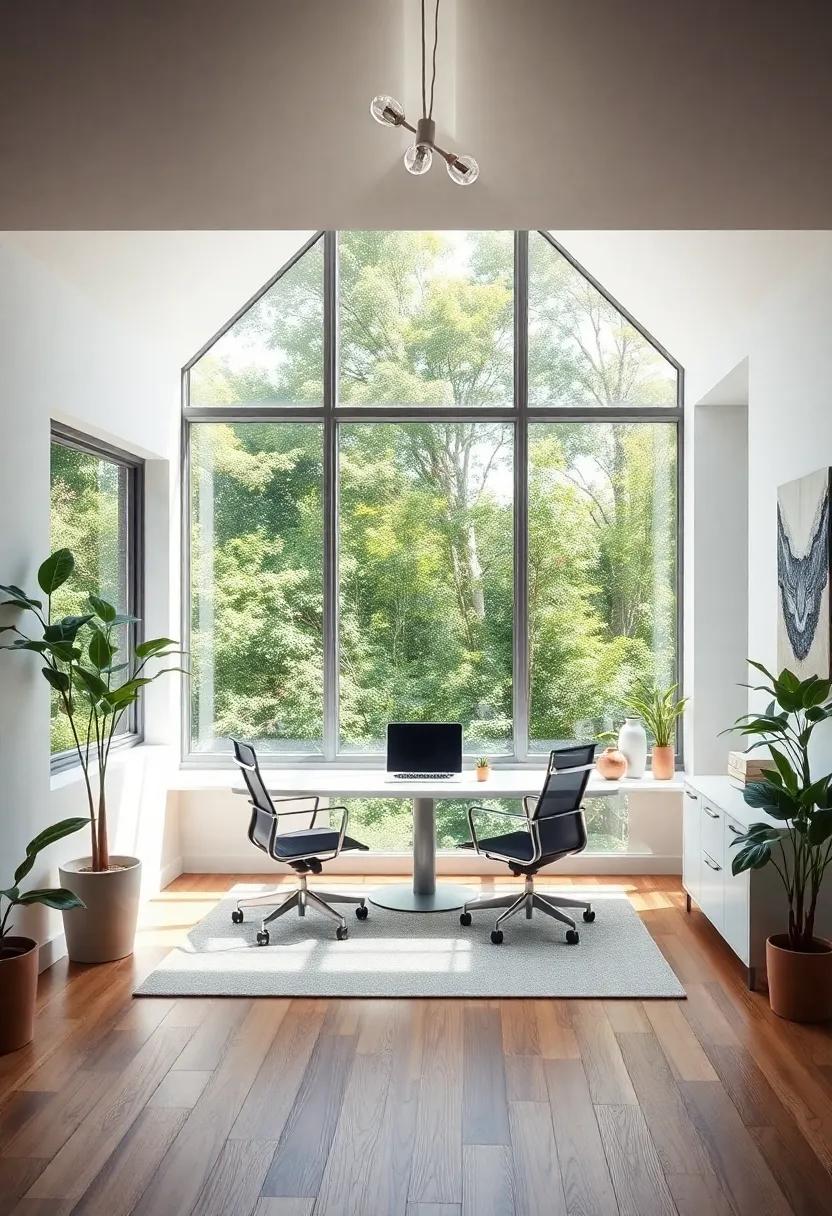
In the quest for an ideal work environment, homeowners are frequently enough left grappling with the challenge of creating spaces that are both useful and aesthetically pleasing.Expansive windows allow natural light to flood in, helping to stimulate creativity, enhance mood, and boost productivity. However, the integration of nature into these designs requires careful consideration of several elements to ensure they complement rather than clash with functional needs. Key design components include:
- Material Choices: Incorporating sustainable materials such as bamboo or reclaimed wood can enhance the natural aesthetic while maintaining durability.
- Plant Integration: Strategically placing indoor plants not only purifies the air but also offers a visual connection to the outdoors.
- Furniture Layout: An open floor plan encourages flow between work and rest areas, while ensuring optimal usage of space without feeling cluttered.
The relationship between indoor and outdoor spaces is paramount in creating biophilic home offices. While expansive windows provide connection to the outside world, their design must also address potential downsides, such as excessive heat or glare. solutions like adjustable shades or utilizing reflective surfaces can mitigate these issues effectively. When designing such spaces, consider the following functional aspects:
| Aspect | Consideration |
|---|---|
| Ventilation | Incorporate operable windows for fresh air circulation. |
| Light Control | Use smart glass technology for adaptable lighting. |
| Acoustics | Consider soundproofing solutions for tranquility. |
The Benefits of Open-Air Workspaces and Their Indoor Adaptation
Open-air workspaces, with their exposure to natural elements, have long been celebrated for their ability to enhance creativity, boost morale, and improve productivity. By seamlessly integrating nature into the workspace, these environments promote a sense of well-being that traditional indoor offices often lack. The numerous benefits include:
- Increased Natural Light: Abundant daylight can enhance mood and reduce fatigue.
- Enhanced Air Quality: Exposure to plants and outdoor air can improve cognitive functions.
- Encouragement of movement: Open spaces encourage more physical activity and breaks.
- Improved Collaboration: Shared open-air settings facilitate dialogue and teamwork.
Bringing these principles indoors, the rise of biophilic design in home offices has led to the incorporation of elements that mimic the refreshing atmosphere of open-air environments. Expansive windows and green decor transform the work setting into an inviting space that not only stimulates productivity but also fosters relaxation. Key aspects of biophilic home offices include:
| Biophilic Element | Benefit |
|---|---|
| Natural Plants | Enhance air purification and reduce stress. |
| Large Windows | Provide ample light and views of nature. |
| Natural Materials | Create a calming and inviting atmosphere. |
Enchanting Views: Framing Nature with Expansive Windows
Imagine sitting at your desk, surrounded by natural light that floods your workspace through expansive windows. This design choice not only enhances your productivity but also blurs the line between indoors and outdoors, creating a serene atmosphere that promotes well-being. The beauty of nature becomes a muse, inspiring creativity while you work. Key elements of these marvelous views include:
- Inviting Landscapes: Whether it’s a rolling hillside or a vibrant urban garden, letting the outdoors in can transform your office into a sanctuary.
- Dynamic Lighting: Natural light changes throughout the day, providing a dynamic backdrop that keeps your environment fresh and stimulating.
- Connection to Nature: Large windows not only offer stunning visuals but also foster a sense of tranquility, creating a conducive workplace.
Furthermore,strategically placed expansive windows can serve as focal points,directing attention to the shifting colors of the sky or the flutter of leaves each season. with the right framing, these views can also enhance the aesthetics of your home office, encouraging you to cultivate a workspace that echoes the beauty outside. Consider the following:
| Benefit | Description |
|---|---|
| Increased Mood | exposure to natural light and scenery boosts serotonin levels. |
| Enhanced Focus | Natural views can improve concentration and reduce stress levels. |
| Visual Inspiration | Changing outdoor landscapes can spark creativity and innovation. |
The Synergy Between Interior Design and Outdoor Elements
The integration of outdoor elements into interior spaces has gained significant traction in modern interior design, especially in the context of home offices.By embracing natural materials, earthy color palettes, and organic shapes, designers are creating harmonious environments that foster productivity and well-being. This synergy is most noticeable in spaces illuminated by expansive windows, which not only invite ample natural light but also offer sweeping views of the landscape outside, bridging the gap between indoors and out. The presence of greenery, whether through potted plants or a view of vibrant gardens, enhances the ambiance, creating a sense of tranquility and connection with nature.
Incorporating outdoor elements goes beyond aesthetics; it plays a critical role in enhancing air quality, mood, and cognitive function. Consider the following elements that contribute to a biophilic design approach in home offices:
- Living Walls: Vertical gardens bring nature into the workspace, improving air quality and aesthetics.
- Natural Light: Large windows not only brighten the space but also regulate circadian rhythms, boosting energy levels.
- Earthy Textures: Incorporating materials like wood, stone, and soft textiles evokes the feeling of being outdoors.
- Views of Nature: Positioning desks to overlook natural scenery can significantly enhance creativity and reduce stress.
Finding Inspiration in Nature: Creating a Serene Workspace
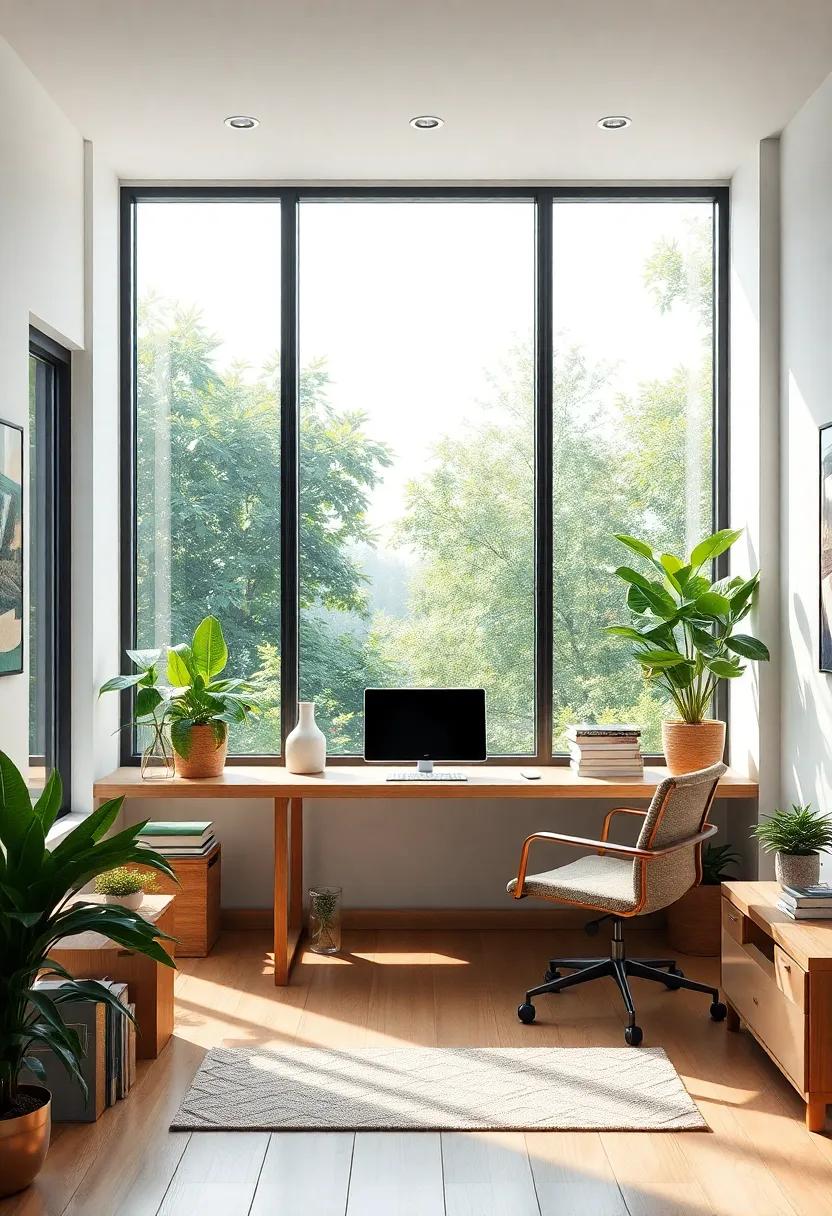
Embracing the elements of nature within your workspace fosters a tranquil atmosphere that enhances creativity and productivity. Consider incorporating natural materials into your interior, such as wood, stone, and plant fibers.These elements not only add texture and warmth, but they also help create a harmonious environment. Additionally, utilizing an expansive window can maximize natural light and offer uninterrupted views of the outdoors, allowing you to stay connected with nature even while indoors.
To further enrich your workspace, personalize it with elements that resonate with the natural world:
- Indoor plants: Bring life into your office with greenery that purifies the air.
- Water features: A small fountain can provide calming sounds that reduce stress.
- artwork: Choose pieces that reflect nature, like landscapes or botanical illustrations.
- Natural light: Position your desk near a window to soak in sunlight and observe the changing seasons.
Seasonal Changes: Adapting your Biophilic Office throughout the Year
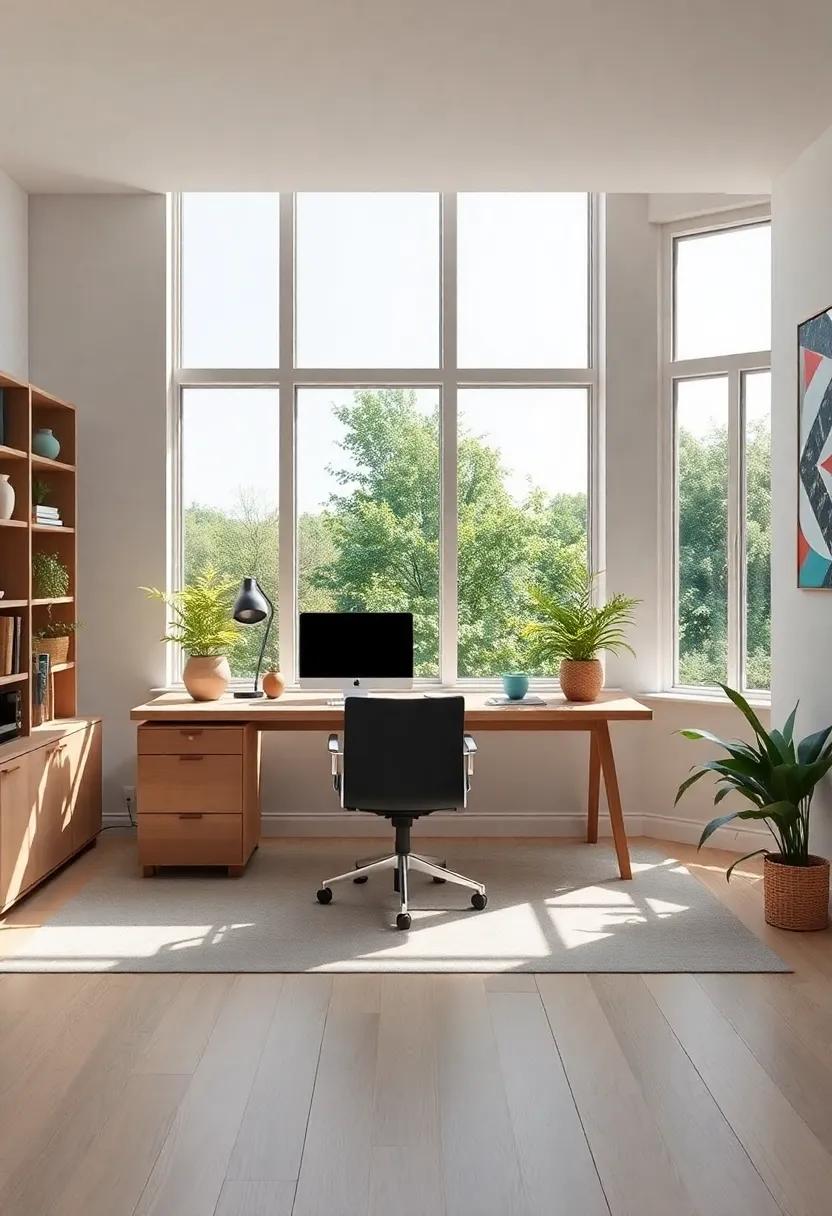
Adapting your biophilic office to reflect the seasonal changes can greatly enhance the well-being of those who work within it. As the seasons shift, so too should the elements of your workspace. Consider making these adjustments:
- Spring: Incorporate vibrant flowers and greenery that symbolize rebirth. Potted plants like tulips and daffodils can bring fresh energy.
- Summer: Embrace natural light by opening curtains and adding reflective surfaces to amplify sunlight. Use light-colored decor to keep the atmosphere airy.
- Autumn: transition to warmer tones with leaves,such as shades of orange and gold. Utilize cozy textiles to invite comfort as the temperature cools.
- Winter: Create a warm and inviting space with elements like evergreen plants and candles to counteract the cold and dark days.
Moreover, it’s beneficial to invest in adjustable elements that respond to the seasons, both aesthetically and functionally.For instance, consider the following options:
| Season | adjustable Element | Impact |
|---|---|---|
| Spring | Lightweight curtains | Maximizes natural light |
| Summer | Cooling fans | Enhances comfort |
| Autumn | Warm throw blankets | Increases coziness |
| Winter | Space heaters | Maintains warmth |
Nature-Inspired Color Palettes for a Soothing Work Atmosphere
Choosing the right color palette for your workspace can significantly impact your productivity and overall well-being. Nature-inspired hues such as soft greens, earthy browns, and sky blues can mimic the serene landscape outside your expansive windows. To create a harmonious environment, consider incorporating a mix of muted and vibrant tones, reminiscent of various elements found in nature. For example:
- Forest Green: Creates a calming atmosphere and improves focus.
- Sandy Beige: Adds warmth and a touch of grounding.
- Ocean Blue: Encourages creativity and relaxation.
- Sunset Orange: Injects energy while maintaining a warm vibe.
Using these colors in your workspace can elevate your interior décor while fostering a soothing ambience. to visualize how these colors work together, here’s a simple table showcasing their combinations and effects:
| Color | Effect |
|---|---|
| Soft Greens | Promotes tranquility and reduces stress |
| Muddy browns | Enhances stability and connection |
| Powdery Blues | Stimulates clarity and calmness |
| Warm Terracotta | Encourages warmth and invites creativity |
To Wrap It Up
As we embrace the concept of biophilic design in our home offices, the integration of expansive windows becomes not just a luxury, but a vital component of our everyday work life. The gentle interplay of natural light with the vibrant hues of nature fosters a sense of calm and productivity, revitalizing our indoor spaces while maintaining a deep connection to the world outside. In this transformative era, where remote work is becoming the norm rather than the exception, letting nature in invites a breath of fresh air into our routines and minds.
With each new trend in home office design, we are reminded of our intrinsic bond with nature—a bond that can inspire creativity and enhance well-being. As you consider your workspace, whether through the sheer beauty of a view or the warmth of sunlight filtering through, remember that bringing nature indoors is more than a design choice; it’s an invitation to thrive in harmony with our environment. So,as you embark on your own journey of crafting a biophilic sanctuary,may you find inspiration in the beauty around you,creating a workspace that not only reflects your personality but also nurtures your spirit. Here’s to working in environments that uplift us, one window at a time.
 decorifusta Garden and patio decoration inspiration
decorifusta Garden and patio decoration inspiration 